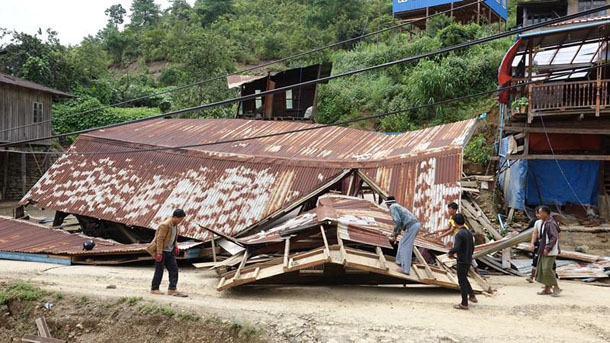PATHEIN, Irrawaddy Division — Food is in short supply in much of northwestern Burma’s Chin State, where two main cities have been cut off by landslides caused by heavy monsoon rain in recent weeks.
Some supplies have reached the capital, Hakha, and Falam in the northernmost reaches of the state, aid workers said, but the deliveries dropped in by military helicopters are not sufficient for the sheer number of people displaced or trapped by storms.
“Around six choppers have come here,” said Pa Kap, who leads the Rone Taug rescue team in Hakha. “the government is providing rice and other supplies for relief camps, but it isn’t enough. The entire town is trapped and short of food—we need much more.”
The township of roughly 469,000 had been cut off by a July 29 landslide on the Union Highway, which links the remote state with central Burma. The government and independent donors have been sending intermittent relief shipments, but the deliveries are few and far between.
Adding to a general food shortage caused by transport disruptions, some 6,600 people have been moved to emergency shelters because of flooding and related dangers, local aid workers said. Pa Kap estimated that each of the township’s 13 emergency relief camps needed 70 to 100 sacks of rice per day.
“It is impossible to feed the entire town with a single helicopter [full of food],” he said.
Those further north in Falam are experiencing similar shortages as the Kale-Falam road is currently impassable due to landslides and other storm debris. Resident Tin Nan told The Irrawaddy that only small cars are able to make the journey. As trucks are unable to make deliveries, he said, “shops have nothing to sell.”
The shortages are far reaching, as landslides have also blocked all roads linking the town to five nearby villages, leaving thousands of people struggling for basic goods. Communication is scarce in the mountainous zone, though reports have surfaced of entire villages being washed away by flash flooding. According to the local chapter of the Union Solidarity and Development Party (USDP), as many as 50 homes were destroyed in Tonzang Township’s Narl Zan village, sending families fleeing for refuge. Similar stories have emerged from Tedim Township, where local media has reported that scores of homes were swept away in Kaking and Laibone villages.
Transport in and out of the state—Burma’s poorest—is now all but impossible by land, while roads linking districts within the state have also become mostly useless after severe damage to several key bridges.
Bam Min Htan, chairman of the Tonzang chapter of the USDP, told The Irrawaddy that car travel was no longer possible because of erosion on the bridge linking his township to Tedim. Relief is coming elsewhere, however, as the state government has already begun clearing off the Hakha-Falam-Kale road with bulldozers to reopen access to the state’s central trading hub.
Ko Paung, joint secretary of the USDP in Chin State, said repairing the road “might need a lot of efforts as the dangers are serious,” but the job should be done within a week. Until then, he said, “we have to eat sparingly.”
Last Friday, Chin State, Arakan State, Magwe Division and Sagaing Division were declared disaster zones by the government after Cyclone Komen made landfall in neighboring Bangladesh, dropping torrential rain on some of Burma’s poorest and already inundated regions.
Figures from the state-run Global New Light of Myanmar on Tuesday said the nationwide flooding had damaged more than 426,000 acres of farmland and destroyed some 56,000 more. A total of 1,387 schools have been temporarily shuttered.
Some 217,000 people were directly affected by the crisis, which is said to be the worst flooding the country has seen in decades. At least 46 flood-related deaths have been reported by the Ministry of Social Welfare, Relief and Resettlement as of late Tuesday, though the toll is expected to rise.
Area-specific death tolls are not yet available, but aid workers in Chin State said they were aware of one death in Hakha and another in Falam Township’s Tamon village. More than 600 homes have been damaged, mostly by landslides, which remain an enormous risk in the days and weeks to come.
Vice President Nyan Tun reportedly visited the capital on Aug. 2, promising that food and other supplies would be delivered in a timely manner. The following day, several Burmese businessmen and celebrities brought food aid to the town. Among the high-profile donors were Ayayarwady Bank chairman Zaw Zaw; Shwe Thanlwin Media chairman Kyaw Win; Ayeyar Hintha chairman Zaw Win Shein; Aung Myin Thu chairman Hla Myo; Lu Min of the Myanmar Motion Picture Association; actor Wai Lu Kyaw and singer Sai Si Twan Khen.

















